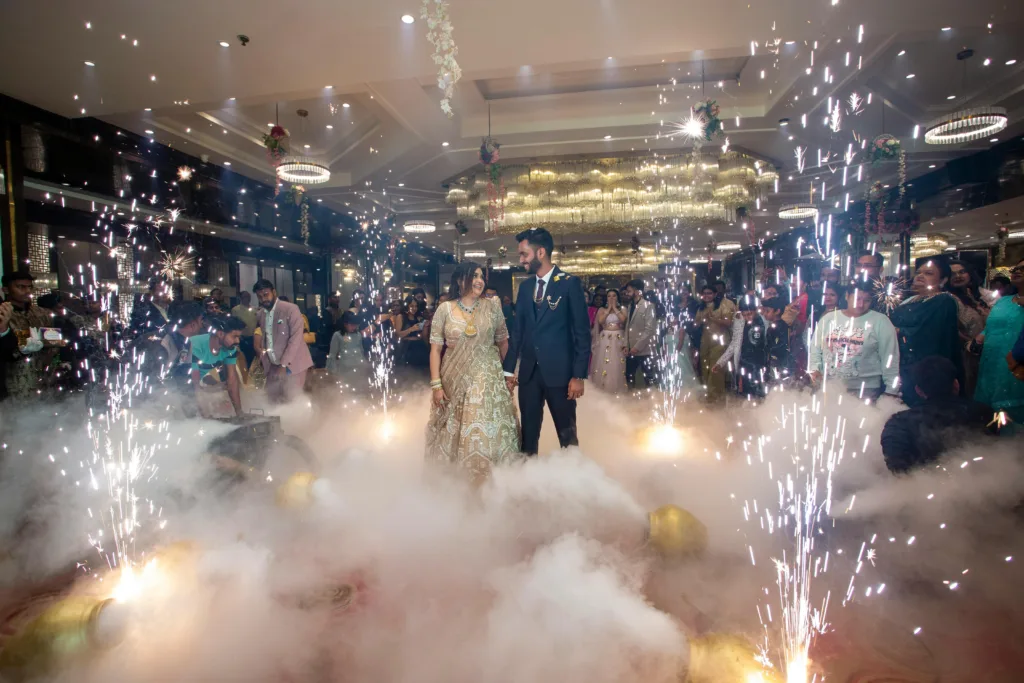NEW DELHI — India’s hospitality sector has discovered a lucrative new revenue stream through the exploding fake Indian wedding trend. Major hotel chains are reporting record-breaking event bookings as millennials and Gen Z consumers embrace ticketed wedding experiences that deliver all the celebration without the inconvenient necessity of actually finding someone to marry.
The fake wedding business model transforms traditional ceremonies into purchasable experiences, creating “wedding tourism” for the romantically unattached. Guests pay ₹1,500-5,000 to attend elaborate sangeet parties with baraat processions, choreographed dance performances, mock varmala ceremonies, and professional pandits conducting what industry insiders call “ceremonial theater.”
“We’ve essentially unbundled the Indian wedding experience like a tech startup disrupting arranged marriage,” explains the Events Director at Mumbai’s leading luxury hotel chain. “We’ve isolated the celebration elements and made them accessible to anyone seeking authentic Indian wedding vibes without the lifelong emotional baggage.”
Hospitality Earnings Show Fake Wedding Revenue Surge
Major Indian hospitality companies are breathlessly highlighting fake wedding services in quarterly earnings reports, treating the commodification of sacred ceremonies as their latest innovation breakthrough. Leading hotel chain ITC reported 23% increased event revenue in Q4 2024, with fake wedding bookings representing 18% of total banquet reservations—a statistic executives present with enthusiasm typically reserved for discovering oil deposits.
During investor calls, hospitality executives described fake weddings as a “previously untapped market segment” targeting consumers who want wedding experiences without marriage commitments. One executive reportedly told investors, “We’ve identified people who enjoy the aesthetic of lifelong commitment without the actual commitment part—it’s genius.”
The Taj Group announced dedicated fake wedding properties after reporting 31% higher profit margins on experiential wedding packages. Lemon Tree Hotels created a “Celebration Without Commitment” business division—a name that would make relationship counselors weep—projecting ₹85 crore revenue by fiscal 2026. Company stock increased 7% following the announcement.
International chains report fake weddings as their fastest-growing category, with Marriott noting fake wedding bookings outpace authentic weddings by 3:1 in metropolitan markets. “We’re basically selling people dreams about relationships they don’t have,” one executive explained with remarkable candor.
Hotel Industry Transforms Weddings Into Performance Art
Premium venues report fake weddings generate 40% higher revenue than corporate functions, primarily because fictional relationships require no actual relationship management. Managers cite improved margins due to complete absence of mother-in-law drama and the blessed elimination of seating chart politics.
Luxury hotels now provide interactive experiences where guests vote on ceremony plot developments through mobile apps—determining whether hired actors will create dramatic objections or surprise twin brother revelations. It’s essentially dinner theater meets arranged marriage meets Black Mirror.
Some properties describe their services as “interactive matrimonial simulation experiences,” which sounds like a Silicon Valley startup pitch after consuming too much ayahuasca.
Consumer Psychology Reveals Existential Crisis
Social researchers identify fake weddings as “gamification” of life milestones, turning major human experiences into purchasable content for social media validation. The target demographic consists of urban millennials and Gen Z consumers delaying marriage, apparently preferring to practice being married before committing to the concept.
Traditional wedding planners report existential confusion over providing matrimonial services for events lacking actual couples. One industry veteran noted, “I’ve planned weddings where families hated each other, but at least everyone agreed someone was getting married.”
International Expansion Reaches Peak Cultural Export
Hospitality chains are developing fake wedding packages for international tourists seeking “authentic cultural experiences” that are, by definition, completely inauthentic. Marketing executives describe this as “exporting Indian celebration culture with professional context,” which sounds like diplomatic language for “selling our traditions to tourists as entertainment.”
Early programs in Dubai and London show strong tourist interest, proving cultural commodification knows no borders.
Market Impact Signals Society’s Relationship With Reality
The trend reflects broader shifts in treating cultural milestones like subscription services that can be sampled without commitment. Some venues report customer confusion between authentic and simulated events, leading to “Reality Check” policies and enhanced communication about whether anyone is actually getting married.
Participants consistently report high satisfaction, describing experiences as providing wedding enjoyment without relationship pressures—essentially the emotional equivalent of methadone for commitment issues.
The fake Indian wedding trend demonstrates the hospitality industry’s remarkable ability to monetize literally anything, including the absence of genuine human connection. As one analyst noted, “We’ve successfully commercialized the fear of commitment itself.

